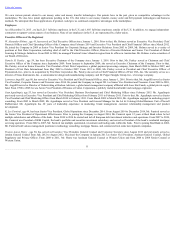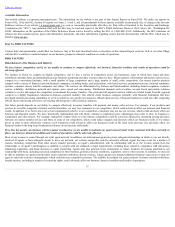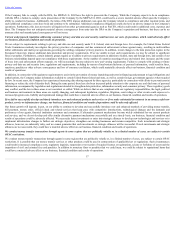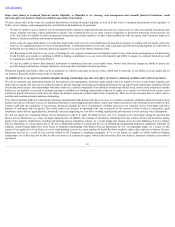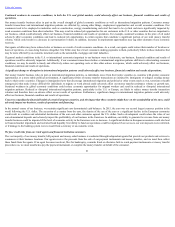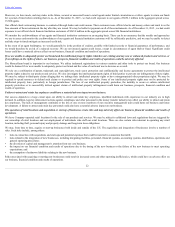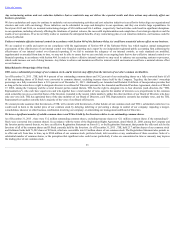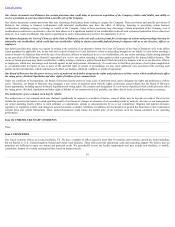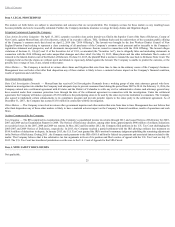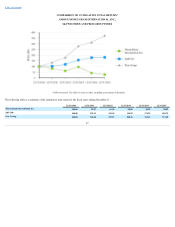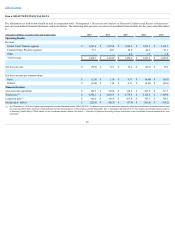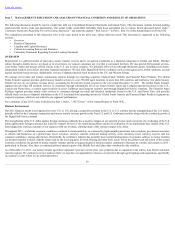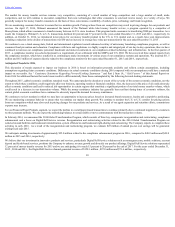MoneyGram 2015 Annual Report Download - page 22
Download and view the complete annual report
Please find page 22 of the 2015 MoneyGram annual report below. You can navigate through the pages in the report by either clicking on the pages listed below, or by using the keyword search tool below to find specific information within the annual report.
Table of Contents
Continued weakness in economic conditions, in both the U.S. and global markets, could adversely affect our business, financial condition and results of
operations.
Our money transfer business relies in part on the overall strength of global economic conditions as well as international migration patterns. Consumer money
transfer transactions and international migration patterns are affected by, among other things, employment opportunities and overall economic conditions. Our
consumers tend to be employed in industries such as construction, energy, manufacturing and retail that tend to be cyclical and more significantly impacted by
weak economic conditions than other industries. This may result in reduced job opportunities for our customers in the U.S. or other countries that are important to
our business, which could adversely affect our business, financial condition and results of operations. For example, sustained weakness in the price of oil could
adversely affect economic conditions and lead to reduced job opportunities in certain regions that constitute a significant portion of our total money transfer
volume, which could result in a decrease in our transaction volume. In addition, increases in employment opportunities may lag other elements of any economic
recovery.
Our agents or billers may have reduced sales or business as a result of weak economic conditions. As a result, our agents could reduce their number of locations or
hours of operation, or cease doing business altogether. Our billers may have fewer consumers making payments to them, particularly billers in those industries that
may be more affected by an economic downturn such as the automobile, mortgage and retail industries.
If general market conditions in the U.S. or international economies important to our business were to deteriorate, our business, financial condition and results of
operations could be adversely impacted. Additionally, if our consumer transactions decline or international migration patterns shift due to deteriorating economic
conditions, we may be unable to timely and effectively reduce our operating costs or take other actions in response, which could adversely affect our business,
financial condition and results of operations.
A significant change or disruption in international migration patterns could adversely affect our business, financial condition and results of operations.
Our money transfer business relies in part on international migration patterns, as individuals move from their native countries to countries with greater economic
opportunities or a more stable political environment. A significant portion of money transfer transactions are initiated by immigrants or refugees sending money
back to their native countries. Changes in immigration laws that discourage international migration and political or other events (such as war, terrorism or health
emergencies) that make it more difficult for individuals to migrate or work abroad could adversely affect our money transfer remittance volume or growth rate.
Sustained weakness in global economic conditions could reduce economic opportunities for migrant workers and result in reduced or disrupted international
migration patterns. Reduced or disrupted international migration patterns, particularly in the U.S. or Europe, are likely to reduce money transfer transaction
volumes and therefore have an adverse effect on our results of operations. Furthermore, significant changes in international migration patterns could adversely
affect our business, financial condition and results of operations.
Concerns regarding the financial health of certain European countries, and the impact that these countries might have on the sustainability of the euro, could
adversely impact our business, results of operations and financing.
In the normal course of our business, we maintain significant euro denominated cash balances. In 2015, the euro was our second largest currency position in the
world following the U.S. dollar. The secession of a country from the euro, the demise of the use of the euro or a significant decline in the European economies
could result in a sudden and substantial devaluation of the euro and other currencies against the U.S. dollar. Such a development could reduce the value of our
euro-denominated deposits and adversely impact the profitability of our business in the Eurozone. In addition, our ability to generate fee revenue from our money
transfer business could be impaired if the level of economic activity in the Eurozone were to decrease. A significant decline in European economies could also lead
to financial market impairment and restricted bank liquidity. Our ability to fund our operations could be impaired if our access to our euro deposits were restricted,
or if damage to the banking system were to result from a currency or an economic crisis.
We face credit risks from our retail agents and financial institution customers.
The vast majority of our money transfer, bill payment and money order business is conducted through independent agents that provide our products and services to
consumers at their business locations. Our agents receive the proceeds from the sale of our payment instruments and money transfers, and we must then collect
these funds from the agents. If an agent becomes insolvent, files for bankruptcy, commits fraud or otherwise fails to remit payment instruments or money transfer
proceeds to us, we must nonetheless pay the payment instrument or complete the money transfer on behalf of the consumer.
21


